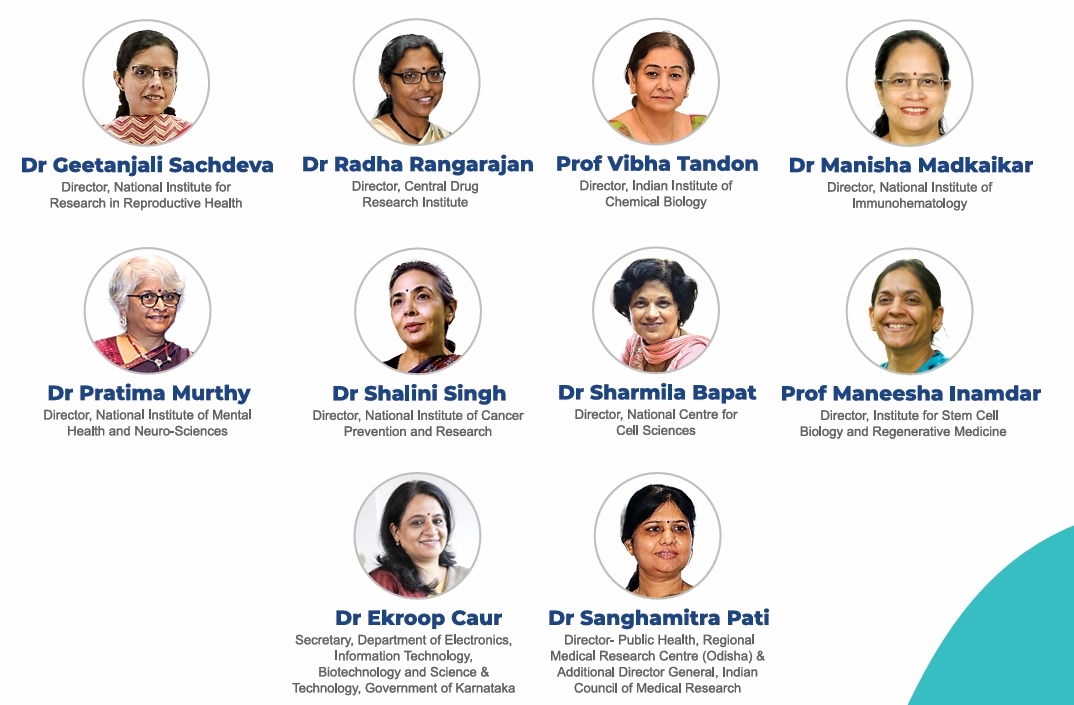10 Women ‘Power Players’ of Bio Research & Policy
March 01, 2025 | Saturday | Features
BioSpectrum features 10 women leaders and influencers heading policy matters related to biotechnology, and directing academic institutes
As revealed in Finance Minister Nirmala Sitharaman's Economic Survey 2024-25, for the first time in seven years, India’s female labour force participation rate (FLFPR) has seen a significant rise, jumping from 23.3 per cent in 2017-18 to 41.7 per cent in 2023-24.
The Economic Survey underscores how women-led businesses thrive under government support. As of October 31, 2024, over 73,151 startups with at least one woman director have been recognised under the Startup India Initiative, nearly half of all registered startups in India.
Additionally, Union Budget 2025-26 has listed new initiatives to support women entrepreneurs across various sectors within the industry. While the number of women entrepreneurs in the country has been increasing over the years, there has not been much change at the women leadership level in both the public and private sectors. There are very few women leaders who have the opportunity to take charge of an entire academic institute or a government posting, thereby contributing to the growth of our country.
For instance, biologist Dr Chandrima Shaha became the first-ever woman president of the Indian National Science Academy (INSA), in 2020. In 85 years of its existence, the Academy had never had a woman president until she took over.
Quoting another example, Professor Anju Seth was appointed as the first woman director of the Indian Institute of Management in Kolkata in 2018, but she resigned amidst conflict with the board much before her term got over.
Dr Renu Swarup, who has served as the Secretary of the Department of Biotechnology, became the first woman to serve as the Secretary of the Department of Science and Technology, back in 2021, but the term lasted for only a few months.
Senior electrochemical scientist Nallathamby Kalaiselvi became the first woman director general of the Council of Scientific and Industrial Research (CSIR) in 2022 and is still going strong.
Then there is Dr Preeti Aghalayam who has been named the first woman director of the Indian Institute of Technology (IIT) in 2023, taking charge of a new division in Tanzania, thereby underlining the skewed gender ratio at the country's premier engineering institutions which still has a long way to go despite constant efforts to improve gender ratio.
In another significant milestone, Kanchan Devi was appointed as the first woman officer to hold the position of Director General (DG) of the Indian Council of Forestry Research Education (ICFRE) in 2023, under the Union Ministry of Environment, Forest, and Climate Change.
Recently, Surgeon Vice Admiral Arti Sarin became the first woman to head the Director General of the Armed Forces Medical Services (DGAFMS), as a boost to women's empowerment in the armed forces.
Focusing specifically on the life sciences sector, there are currently less than 20 per cent women-led academic institutes within the public sector, working towards the development of new drugs, vaccines, diagnostic devices, medical equipment, etc. Likewise, there are very few women leaders within the Ministries and Departments in government settings, who have the opportunity to drive life sciences advancements in the country.
Since International Women’s Day 2025 is observed on March 8, under the theme, “For All Women and Girls: Rights. Equality. Empowerment,” BioSpectrum has featured 10 women leaders and influencers heading policy matters related to biotechnology, and directing academic institutes affiliated to the Indian Council of Medical Research (ICMR) and Council of Scientific and Industrial Research (CSIR), thereby emerging as the driving forces of research and development in India in life sciences space.
- Dr Ekroop Caur, Secretary, Department of Electronics, Information Technology, Biotechnology and Science & Technology, Government of Karnataka
- Dr Radha Rangarajan, Director, CSIR-Central Drug Research Institute
- Prof. Vibha Tandon, Director, Indian Institute of Chemical Biology
- Dr Manisha Madkaikar, Director, National Institute of Immunohematology
- Dr Sanghamitra Pati, Director- Public Health, Regional Medical Research Centre (Odisha) & Additional Director General, Indian Council of Medical Research
- Dr Shalini Singh, Director, National Institute of Cancer Prevention and Research
- Dr Sharmila Bapat, Director, National Centre for Cell Sciences
- Prof. Maneesha Inamdar, Director, Institute for Stem Cell Biology and Regenerative Medicine
- Dr Geetanjali Sachdeva, Director, National Institute for Research in Reproductive Health
- Dr Pratima Murthy, Director, National Institute of Mental Health and Neuro-Sciences









